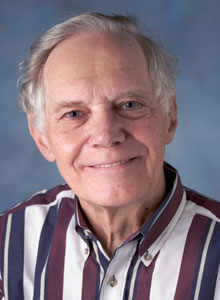
Neisser came to Emory in 1983 and founded the Emory Cognition Project. Photo courtesy of Cornell University.
Ulric Neisser, a former Emory Woodruff Professor of Psychology and author of the groundbreaking 1967 book "Cognitive Psychology," died on Feb. 17 in Ithaca, N.Y., due to complications from Parkinson's disease. He was 83.
Known as the father of cognitive psychology, Neisser revolutionized the discipline by challenging behaviorist theory and endeavoring to discover how the mind thinks and works. He was particularly interested in memory and perception.
In 1986, while teaching at Emory, Neisser conducted a famous experiment that centered on the space shuttle Challenger explosion. The day following the tragedy, he asked students to write down their impressions immediately after hearing the news; then, almost three years later, he had them perform the same exercise again. Most of the accounts were remarkably different—supporting Neisser's theory that the mind distorts and reshapes the past, drawing on layered memories rather than actual events.
Neisser came to Emory in 1983 and founded the Emory Cognition Project, which became an international center for the emerging field during his 13 years here, producing dozens of influential reports and a series of books stemming from the Emory Symposia in Cognition and Development. Now directed by Robyn Fivush, Samuel Candler Dobbs Professor of Psychology and chair of the Department of Psychology, the Emory Cognition Project remains a vibrant force in the study of cognition.
"Dick [Neisser] was a terrific department, college and university citizen. He was a delightful presence among the faculty and continued to do major work—for example, on flashbulb memory—while at Emory," says Robert McCauley, William Rand Kenan Jr. University Professor and director of the Center for Mind, Brain, and Culture.
Born in Germany in 1928, Neisser immigrated to the United States with his family in 1933. He received degrees from Harvard and Swarthmore and went on to teach at Brandeis and Cornell as well as Emory, before retiring in Ithaca with his wife. He is survived by four children from his first marriage to Anna Gabrielle Pierce, and a son from his second marriage to Arden Seidler, who died before him. Other survivors include a stepdaughter, a sister and a grandson.
